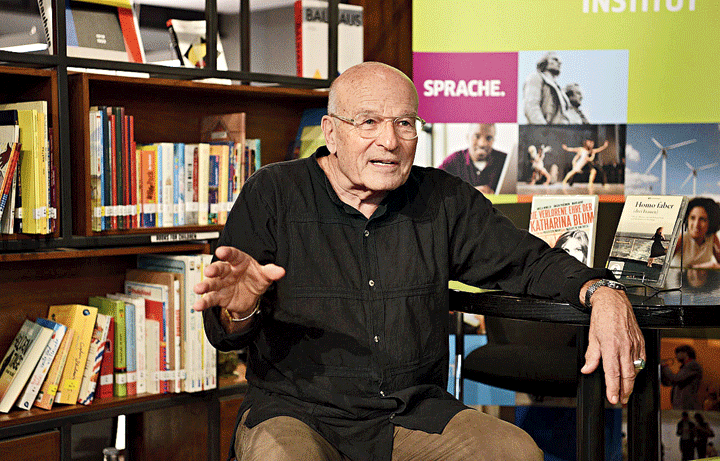An 80-year-old Palme d’Or and Oscar-winning director from Berlin will be taking two master classes at the Kolkata International Film Festival (KIFF) on adapting literature and working with actors.
Seven of Volker Schlondorff’s films will be shown at the festival.
Some of Schlondorff’s best works, including the acclaimed Tin Drum based on Gunter Grass’s eponymous novel, are literary adaptations. “That is one area I can now say I have some authority on,” he smiled.
“I do not like literary adaptations. But literature is my fate. Had I based my first film on my own experience in place of a novel, I would have been a different filmmaker, probably a more interesting one,” Schlondorff reflected over coffee at Max Mueller Bhavan on Saturday.
When Schlondorff started out, the Oberhausen manifesto, a declaration by 26 young German filmmakers that gave birth to New German Cinema, was released. “The feeling was all over Europe, that the movies in the cinemas had nothing to do with our lives but were of another generation. It was a revolt of a generation against another.” The biggest influence on him was the French filmmaker Louis Malle. “I was fascinated by his way of working and even his approach to life.”
On his return from Calcutta, Schlondorff plans to see Malle’s “infamous documentary on India, especially the one on Calcutta”. Malle had fallen foul of the Indian government for his portrayal of pre-modern rituals and festivities.
Reminded of The Tin Drum author Gunter Grass’s controversial take on the city, he recalls a second film project with Grass. “It was to be on a tour agency which specialised in bringing tourists to slums, including sleepovers. It would be a satire on rich people’s curiosity about how the poor lived. A couple debated whether to have a child or not in a slum where poor people have eight children without asking whether they should! It seemed absurd. Of course, the danger was in India it would be seen as criticising (India) whereas it was European society that he was criticising, not Bengal or Calcutta. Even when his role model is a rat (like in the novel The Rat), for him it is a positive animal, smarter than human beings, from which we should learn instead of despising them. But I understand it was probably very misunderstood.”
The film never got made. “He turned the screenplay into a novel called Headbirths. The subtitle was ‘The Germans are dying out’,” he grinned.
He has done ample work on TV as also a couple of operas. “I am a sucker for shows. I could have made a circus,” he laughed. He has done films in English and French too. “I speak five languages fluently. I got a Cesar (highest film award in France) for a French screenplay I wrote recently. I am a bit of a chameleon.”
Schlondorff had been to India once, in 1979 for a film festival in Mumbai. Since he landed in Calcutta on Friday, he was struck by the abun-dance of life on the streets. “You don’t see people eating or debating in groups in Manhattan or Berlin streets, where nobody ever stops.”
The lack of variety on local television has surprised him. “If there are 300 channels in my hotel room, 250 are showing Bollywood or telenovellas. And you go out to the streets and you find nothing like it in real life. The taxi may be falling apart but there are flowers and a medallion and the driver has some music on. I thought the guy lives in two worlds! Then a phone call comes from his wife and now he is in a telenovella with marital conflicts! The escapism reaches a different level here. May be that is the only way to deal with the harshness of reality.”
He admitted that he does “not know India except through movies”. “They are my only immersion,” he said, adding that Satyajit Ray’s The Music Room is a favourite. “Relationships do not interest me. Social struggles, how people deal with poverty, do.”
He loves music in films. “It is easy to dispense with dialogue but not music. In the Apu trilogy, the interaction between language and music is so important that I tried to imitate it sometimes.”
For now, he is off to Sahibgunj, Jharkhand, on the trail of Australian agronomist Toni Rinaudo. “I am making a documentary, The Forest Maker, on the man who spent his adult life in Africa and his method of regreening desertified land by tapping into the root system underneath. I’ve been to four countries in Africa with him and now here.” Told of the recent trend of biopics in Bollywood, he chuckled: “Then I should turn my documentary into one!”










